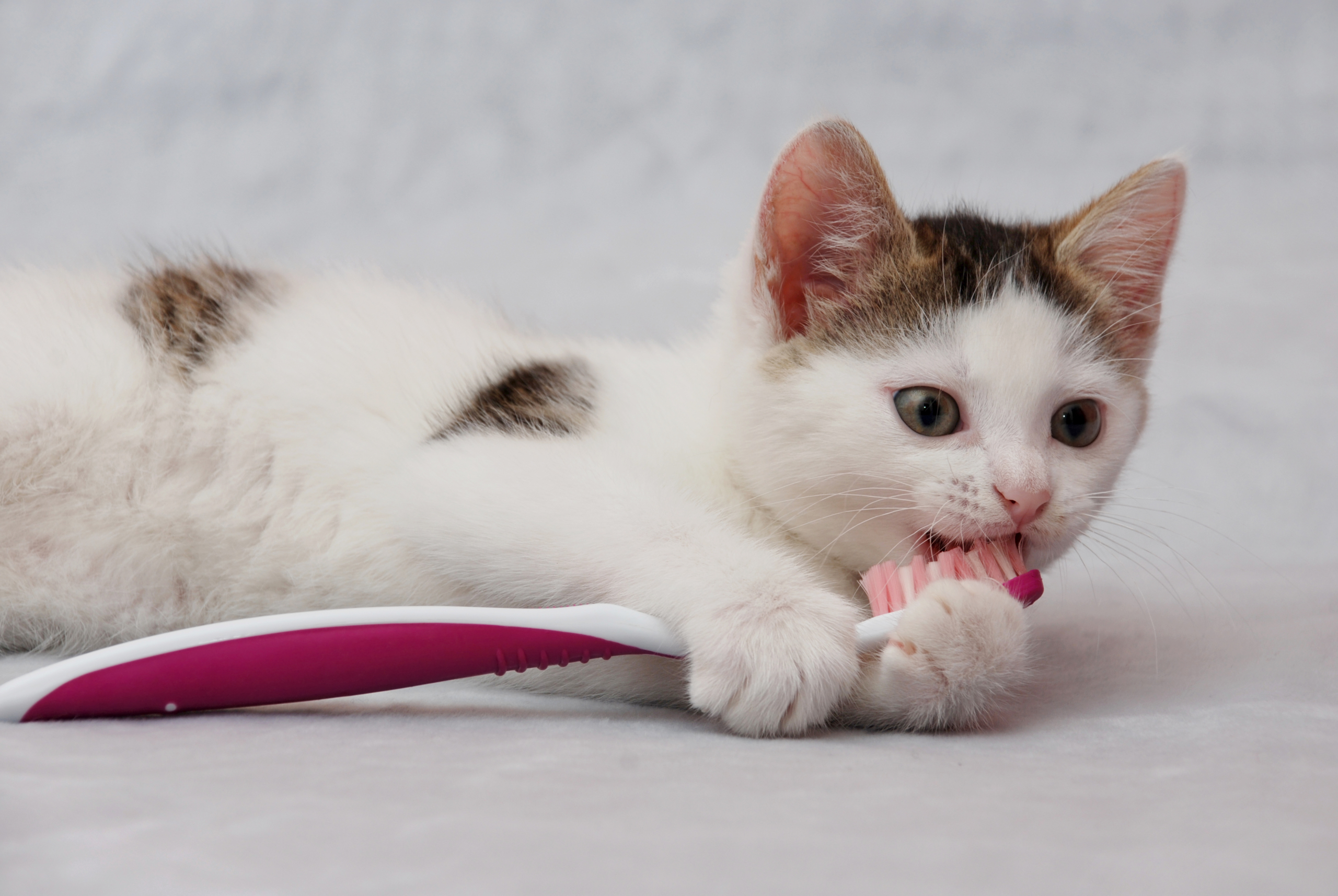If you’re lucky enough to have an affectionate cat who loves to cuddle, you’re a fortunate pet parent, indeed. That is until you get a whiff of your cat’s breath and realize just how grateful you are that humans brush their teeth multiple times a day. There’s tuna breath, and then there’s the fish steamroller that some cats have. Desperately need to know how to freshen cat breath? You’ve come to the right place!

What causes a cat’s bad breath?
Halitosis is the official name for the stench in your cat’s mouth. And while it’s tempting to blame your kitty’s diet, the source of the smell actually comes from the bacteria in their mouth. Don’t reach for an antibiotic as the answer to freshening your cat’s breath, though.
Not all of that bacteria is bad. Some of it’s needed to help break down your cat’s food. The bacteria go to work with the saliva, generating enzymes that start the digestive process. During the process, the compounds that get generated stink. The problem of kitty bad breath then gets worse when too much bacteria hangs around in the mouth.
Feline periodontal disease
As extra bacteria build up in your cat’s mouth, they form a film around the teeth known as plaque. If left untreated (we’ll get to how to solve that problem in a minute), plaque mixes with minerals in the saliva and hardens into tartar. As tartar thickens, the gums around the teeth recede, exposing the tooth root. Now there’s a pocket for food to get stuck in. Or, worse, with nothing to hold onto, the tooth falls out!
This process of damaged teeth and gums is known as periodontal disease. And 85% of cats have some form of periodontal disease by the time they’re 3 years old.
In addition to stinky breath, that extra bacteria can enter the bloodstream, leading to additional complications:
- Cancer
- Medical conditions of the:
- GI tract
- Heart
- Liver
- Kidneys
- Pancreas (i.e., diabetes)
- Poor appetite
So while you want to freshen your cat’s breath, you’ll also be taking steps to protect your cat’s overall health. (It’s a win-win!)
The best solutions for your cat’s bad breath
A professional cleaning
While it’s not an at-home step, making an appointment with your veterinarian for a professional dental cleaning tops the list. You’ll make your cat’s breath smell better, find any problems, and start with a clean canvas.
Your feline family member will get a full set of dental radiographs, a thorough oral exam (performed safely under anesthesia), and a polish and prophy. Then, you can take over with at-home care.
Brushing your cat’s teeth
Nothing works better for freshening a cat’s breath than regular teeth-brushing. Due to their small size, cats appreciate the use of finger brushes, which you wear on your index finger. You gently work the brush over their teeth. If you’ve never brushed your cat’s teeth before, you’ll need to take things slow, but cats can learn to tolerate the process.
When choosing your cat toothpaste and toothbrush, look for the Veterinary Oral Health Council (VOHC) seal of approval. VOHC only approves products guaranteed to slow the progress of plaque and tartar. It approves everything from toothpaste to treats.
Try the additive route
Not all cats appreciate toothpaste (and not every owner feels brave). Dental-water additives work as cat-breath fresheners. A few drops mixed into your cat’s water bowl will help with that tuna halitosis. Just keep in mind that water additives aren’t as effective as brushing, so you’ll need more frequent professional cleanings to make up the difference. Also, some cats hate the taste, and they’ll avoid drinking — not something you want.
Sneaking in dental treats
Cats love treats. Luckily for you, there are a host of dental treats on the market that help scrape that stinky plaque from your cat’s teeth. Your kitty gets a yummy snack, and you get to make your cat’s breath smell better.
Changing up your cat’s diet
The more wet food your cat eats, the more plaque will build up on their teeth. Dry food scrapes that plaque away — so long as they chew their food. (Cats don’t always chew their food. Cats with no teeth can still eat dry food without a problem.) If your vet gives you a heads-up about periodontal disease, you may need to rethink your kitty’s diet.
Whether you switch over to a dental diet or choose to use the diet as a treat (that works, too!), the larger kibble size encourages your cat to chew. The more plaque your cat scrapes off, the better chance you’ll make your cat’s breath smell better.
Hill’s Science Diet has a wonderful Dental Diet that cats love. The chicken flavor appeals to the pickiest appetite, and the kibble design attacks that pesky plaque and tartar. And, of course, you have the VOHC backing!
Stinky breath begone!
Finding ways to freshen your cat’s breath requires a little work. If you’re willing to put in the time to brush your cat’s teeth, though, you’ll find yourself rewarded. Your cat will get a shining, healthy smile, and you’ll get fresher kitty breath.
Happy brushing!
Editors' Recommendations
- Wondering why cats chirp? Fascinating reasons why your cat chirps at birds (and you)
- How to tell if your cat is a Maine Coon mix (and why you should care)
- Your cat trilling is actually a good thing – here’s why
- Why doesn’t my cat meow? Here are 5 reasons why your feline friend is silent
- Is your cat hissing and growling a lot? These 5 tips will work wonders on your feline friend



